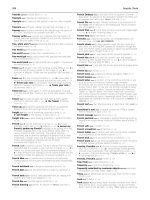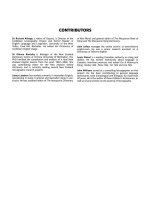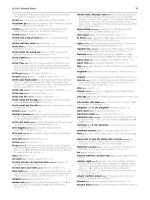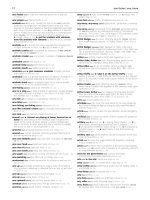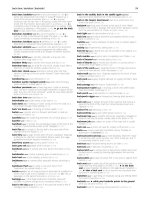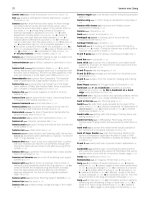Slang and uncoventional english part 3 ppsx
Bạn đang xem bản rút gọn của tài liệu. Xem và tải ngay bản đầy đủ của tài liệu tại đây (121.1 KB, 7 trang )
OBSERVATIONS ON SLANG AND
UNCONVENTIONAL ENGLISH
Some notes on the challenges of lexicography, drawn entirely from the writings
of Eric Partridge (1894–1979)
Partridge wrote widely on matters concerning the English
language. He did not, by any means, restrict his interest to
matters slang and unconventional; however, it is his work
in this area that had, and continues to have, the gr eatest
impact, and on which his reputation is most celebrated.
He wrote more than forty books in his lifetime,
considering such diverse topics as abbreviations, American
tramp and underworld slang, British and American English
since 1900, comic alphabets, English and American
Christian names, Shakespear e’s bawdy, usage and abusage,
and he contributed to many, many more. It is so
substantial a body of work that any list short of a full bib-
liography will inevitably do his great achievement a
disservice. He was a phil ologist, etymologist, lexicographer,
essayist and dictionary-maker; he is a legend and an inspi-
ration.
The flavour, and wisdom, of Partridge’s work is
gathered in the quotations that follow, loosely grouped by
subject, and presented under sub-headings that make new
use of a selection of his book and article titles.
Slang Today and Yesterday
From about 1850, slang has been the accepted term
for ‘illegitimate’ colloquial speech: but since then,
especially among the lower classes, ‘lingo’ has been
a synonym, and so also, chiefly among the cultured
and the pretentious, has ‘argot’. Now ‘ar got’, being
merely the French for ‘slang’, has no business to be
used thus – it can rightly be applied only to French
slang of French cant: and ‘lingo’ properly means a
simplified language that, like Beach-la-Mar and
Pidgin-English, represents a distortion of ( say)
English by coloured peoples speaking English indeed
but adapting it to their own phonetics and grammar.
‘Jargon’ – originally as in Chaucer, used of the
warbling of birds – has long been employed loosely
and synonymously for slang, but it should be
reserved for the technicalities of science, the pro-
fessions and the trades: though, for such technical-
ities, ‘shop’ is an equally good word.
1
[S]lang is much rather a spoken than a literary
language. It originates, nearly always, in speech.
1
Slang is easy enough to use, but very hard to write
about with the facile convincingness that a subject
apparently so simple would, at first s ight, seem to
demand. But the simplest things are the hardest to
define, certainly the hardest to discuss, for it is
usually at first sight only that their simplicity is what
strikes one the most forcibly. And slang, after all, is a
peculiar kind of vagabond language, always hanging
on the outskirts of legitimate speech, but continually
straying or forcing its way into the most respectable
company.
2
Language in general and every kind of language
belongs to everyone who wishes to use it.
3
Slang, being the quintessence o f colloquial speech,
must always be related to convenience rather than
scientific laws, grammatical rules and philosophical
ideals. As it originates, so it flourishes b est, in
colloquial speech.
1
Slang may and often does fill a gap in accepted
language.
1
Words, Words, Words!
Every group or association, from a pair of lovers to a
secret society however large, feels, at some time or
other, the need to defend itself against outsiders,
and therefore creates a slang designed to conceal its
thoughts: and the greater the need for secrecy, the
more extensive and complete is the slang[.]
1
The specialization that characterizes every vocation
leads natur ally to a specialized vocabulary, to the
invention of new words or the re-charging of old
words. Such special words and phrases bec ome slang
only when they are used outside their vocational
group and then only if they change their meaning or
are applied in other ways […] But, whatever the
source, personality and one’s surroundings (social or
occupational) a re the two co-efficients, the two chief
factors, the determining causes of the nature of slang,
as they are of language in general and of style.
1
One kind of eyewash, the army’s innumerable ‘states’
and ‘returns’ was known as bumf, short for bum-
fodder: the abbreviation was common in English
public schools from before 1900; the full term for
toilet-paper dates back to the seventeenth century,
when it was co ined by Urquhart, the translator
of Rabelais; Urquhart is one of the most prolific
originators of the obscenities and vulgarities of our
language, and with him rank Shak espeare and
Burns.
4
In English, the ideas most fertile in synonyms ar e
those of drinking, drunkenness, money, and the sex-
ual organs and act.
1
Many slang words, indeed, are drawn from
pleasurable activities (games, sports,
entertainments), from the joy of life, from a gay
abandon: for this reason it has been wittily called
‘language on a picnic’.
1
Common to – indeed, very common in – the
jazzman’s and the Beatnik’s vocabulary is the noun
pad, whence the entirely Beatnik pad me, a cat’s
invitation to a chick to shar e his room and bed. […]
The Beatniks got it from the jazzmen who got it
from the American underworld who got it from the
British underworld (pad, a bed) who got it from
Standard English of the sixteenth–eighteenth
centuries (pad, a bundle of straw to lie on).
5
The metaphors and allusions [in slang] are generally
connected with some temporary phase, some
ephemeral vogue, some unimportant incident; if the
origin is not nailed down at the time, it is rarely
recoverable.
1
[B]orr owings from foreign languages produce slang;
and every language borrows. Borrowings, indeed,
have a way of seeming slangy or of being welcomed
by slang before standard speech takes them into its
sanctum.
1
War always produces a rich crop of slang.
6
[W]ar (much as we may hate to admit the fact),
because, in all wars, both soldiers and sailors and,
since 1914, airmen and civilians as well, have
imported or adopted or invented hundreds of words,
terms, phrases, this linguistic aspect ranking as, if we
except the unexceptable ‘climate of courage,’ the
only good result of war.
7
Human characteristics, such as a love of mystery and
a confidential air (a lazy freemasonry), vanity, the
imp of perversity that lurks in every heart, the
impulse to rebellion, and that irrepressible spirit of
adventure which, when deprived of its proper
outlook in a ction, perforce contents itself with verbal
audacity (the adventure of speech): these and others
are a t the root of slang[.]
1
Here, There and Everywhere
When we come to slang and familiar speech gener-
ally, we come to that department of the vocabulary
in which British and American differences are
naturally greater than anywhere else, just as they are
greater in the colloquial language generally than in
the literary.
8
American slang is more volatile than English and it
tends, also, to have more synonyms, but a greater
number of those synonyms are butterflies of a day;
English synonyms are used more for variety than
from weariness or a desire to startle. American slang
is apt to be more brutal than Englis h[.]
1
Canada also has an extensive and picturesque
objective slang, but that slang is 80 per cent
American, with the re mainder rather more English
than native-Canadian[…] it is linguistically unfair to
condemn it for being so much indebted to its near
and ‘pushing’ neighbour[.]
1
Australian speech and writing have, from the outset,
tended to be unconventional […] The
unconventionality is linguistic.
9
The truth is that South African slang, as distinct
from indis pensable Africanderisms, is not intrinsically
so vivid, humorous, witty, or divinely earthy as
Canadian and Australian slang, nor is it nearly so
extensive, nor has it, except during the Boer War,
succeeded in imposing itself upon English slang,
much less upon Standard English[.]
1
New Zealand is like South Africa in that its popu-
lation is t oo small to have much influenced the
language of the mother country whether in Standard
or in unconventional English.
1
Usage and Abusage
Some of the upstart qualities [of slang] and part of
the aesthetic (as opposed to the moral) impropriety
spring from the four features present in all slang,
whatever the period and whatever the country: the
search for novelty; volatility and light-headedness as
well as light-heartedness; ephemerality; the sway of
fashion. In the standard speech and still more in
slang we note that the motive behind figurative
expressions and all neologisms is the desire to
escape from the old accepted phrase: the desire for
novelty operates more freely, audaciously, and rapidly
in slang – that is the only diff erence. […O]f the
numerous slang words taken up by the masses and
the classes, most have only a short life, and that
when they die, unhonoured and unsung, they are
almost immediately replaced by novelties equally
transitory: the word is dead, long live the word!
[…S]lang, as to the greater part of its vocabulary and
especially as to its cuckoo-calling phrases and it’s
parrot-sayings, is evanescent; it is the residuum that,
racy and expressive, makes the study of slang revel-
atory of the pulsing life of the language.
1
[S]lang is indicative not only of man’s earthiness but
of his indomitable spirit: it sets him in his proper
place: relates a man to his fellows, to his world and
the world, and to the universe.
10
And slang is employed for one (or two or more) of
thirteen reasons:
1 In sheer high spirits; ‘just for the fun of the
thing’.
2 As an exercise in wit or humour.
3 To be ‘different’ – t o be novel.
4 To be picturesque.
5 To be startling; to startle.
6 To escape from cliché’s and long-windedness.
7 To enrich the language.
8 To give solidity and concreteness to the
abstract and the idealistic, and nearness to the
Observations on slang and unconventional English xvi
distant scene or object.
9 To reduce solemnity, pain, tragedy.
10 To put oneself in tune with one’s company.
11 To induce friendliness or intimacy.
12 To show that one belongs to a certain school,
trade or profession, intellectual set or social
class. In short to be in the fashion – or to
prove that someone else isn’t.
13 To be secret – not understood by those around
one.
11
But no real stylist, no-one capable of good speaking
or good writing, is likely to be harmed by the
occasional employment of slang; provided that he is
conscious of the fact, he can employ it both
frequently and freely without stultifying his mind,
impoverishing his vocabulary, or vitiating the taste
and the skill that he brings to the using of that
vocabulary. Except i n formal and dignified writing and
in professional speaking, a vivid and extensive slang is
perhaps preferable to a jejune and meagre vocabulary
of standard English; on the other hand, it will hardly
be denied that, whether in writing or speech, a sound
though restricted vocabulary of standard English is
preferable to an e qually small vocabulary of slang,
however vivid may be that slang.
1
The Gentle Art of Lexicography
I began early in life: and it is the course of my life
which, allied to a natural propensity to original sin,
has made a lexicographer out of me.
12
For most of us, a dictionary is hardly a book to read;
a good dictionary, however, is a book to browse in.
Some dictionaries are so well written that one just
goes on and on. To write such a dictionary has
always been my ambition.
12
Slang [etymology/lexicography] demands a mind
constantly on the qui vive; an ear c onstantly keyed to
the nuances of everyday speech, whether among
scholars or professional men or craftsmen or
labourers; a ve ry wide reading of all kinds of books.
13
I have read much that is hopelessly inferior,
hopelessly mediocre; and much that, although
interesting, is yet devoid of literary value. But ever
since my taste acquired a standard, I have been able
to extract some profit from even the most trashy
book.
14
There is far more imagination and enthusiasm in the
making of a good dictionary than in the average
novel.
15
Words at War: Words at Peace
For over a century, there have been protests against
the use of slang and controversies on the relation of
slang to the literary language or, as i t is now usually
called, Standard English. Purists have risen in their
wrath and conservatives in their dignity to defend
the Bastille of linguistic purity against the
revolutionary rabble. The very vehemenc e of the
attack and the very sturdinessof the defence have
ensured that only the fittest surv ive to gain entrance
to the citadel, there establish themselves, and then
become conservatives and purists in their turn.
16
Any term that prevents us from thinking, any term
that we employ to spare us from searching for the
right word, is a verbal narcotic. As though there
weren’t too many narcotics already…
17
Words are very important things; a t the lowest
estimate, they ar e indispensable counters of
communication.
18
Notes/bibliography
1 Slang Today and Yesterday, 1933: George Routledge &
Sons, London
2 Slang Today and Yesterday, 1933, quoting Greenough
and Kittredge, Words and their Ways in English
Speech, 1902: George Ro utledge & Sons, London
3 ‘The Lexicography of Cant’, American Speech,Volume
26, Issue 2, May 1951: The American Dialect Society,
Durham, North Carolina
4 ‘Byways of Soldier Slang’ in A Martial Medley, 1931:
Scholartis Press, London
5 ‘A Square Digs Beatnik’, August 1959. Originally
published for priv ate circulation Christmas 1959/New
Year 1960. Collected in ACharmofWords, 1960:
Hamish Hamilton, London
6 ‘Words Get Their Wings’, originally published in
Chamber’s Journal, July-August 1945. Collected in
Words at War: Words at Peace, 1948: Frederick Muller,
London
7 ‘Introduction’ in Dictionary of New Words, Mary
Reif er, 1957: Peter Owen, London
8 British and American English Since 1900,co-authored
with John W. Clark, 1951: Andrew Dakers, London
9 ‘Australian English’ in ACharmofWords, 1960:
Hamish Hamilton, London
10 Usage & Abusage, 1947: Hamish Hamilton, London
[originally published in the US in 1942]
11 The World of Words, 2nd edition, 1939: Hamish
Hamilton, London [reduced by Eric Partridge from a
fuller consideration in Slang Today and Yesterday,
1933, and based on the work of M. Alfredo Niceforo,
Le Génie de l’Argot, 1912]
12 The Gentle Art of Lexicography, 1963: André Deutsch,
London
13 Adventuring Among Words, 1961: André Deutsch,
London
14 Journey to the Edge of Morning, ©1946, reprinted
1969: Books for Libraries Press, New York
15 As C orrie Denison, a pseudonymous epigraph to A
Classical Dictionary of the Vulgar Tongue by Captain
Francis Grose (3rd edition, 1796), edited by Eric
Partridge, 1931: Scholartis Press, London
16 Here, There and Everywhere, 1950: Hamish Hamilton,
London
17 ‘Verbal Narcotics’, originally published in Good
Housekeeping magazine, June 1949. Collected in
From Sanskrit to Brazil, 1952: Hamish Hamilton,
London
18 ‘Words in Vogue: Words of Power’, 1942: collected in
Words at War: Words at Peace, 1948: Frederick Muller,
London
xvii Observations on slang and unconventional English
Aa
A noun 1 amphetamine US, 1967. 2 LSD. An abbreviation of ACID US,
1977
. 3 in a deck of playing cards, an ace US, 1988. < get A into G;
get your A into G to stop idling; to apply yourself to an activity;
to start doing something useful. Euphemistic for
GET YOUR ARSE IN
GEAR NEW ZEALAND
, 2002
A adjective 1 reserved for the best; the best US, 1945. 2 anal US, 1997
a2m noun a scene in a pornographic film in which an object or body
part is withdrawn from a rectum and taken into a mouth without
either washing or editing. Shorthand for ‘ass-to-mouth’
US, 1997
A3 anytime, anyplace, anywhere. An abbreviation used in text
messaging UK, 2003
AAA noun an amphetamine tablet. In the US, the AAA is the national
automobile club, which, like an amphetamine tablet, helps you get
from one place to another
US, 1993
A and A noun in the military, a leave for rest and recreation. A
jocular abbreviation of ‘ass and alcohol’
US, 1966
A and B noun assault and battery US, 1986
aap; arp noun a marijuana cigarette. From Afrikaans for ‘monkey’
SOUTH AFRICA, 1946
aardvark noun an F-111 combat aircraft or any aircraft that is
awkward-looking or difficult to fly. Vietnam war usage US, 1963
ab noun an abscess, especially as a result of injecting drugs US, 1952
AB noun 1 the Aryan Brotherhood, a white prison gang in the US US,
1990. 2 the bleed period of the menstrual cycle. An abbreviation of
‘Annie Brown’ NEW ZEALAND, 1996
ABA noun a traveller’s cheque US, 1985
abb adjective abnormal US, 1991
abba-dabba noun chatter, gossip. Undoubtedly originated with the
song ‘The Aba-Daba Honeymoon’, written in 1913 and re-released
with great success by Larry Clinton and His Orchestra in March
1948, in which ‘abba-dabba’ is the chatter of monkeys
US, 1961
abba-dabba adjective dark-skinned, especially Arabic US, 1975
abbed adjective having well-defined abdominal muscles UK, 2002
abbey noun a swindler who impersonates a priest US, 1950. < on the
abbey
engaged in a swindle involving clergy impersonation US, 1992
abbott noun a capsule of pentobarbital sodium (trade name
Nembutal™), a central nervous system depressant. From the name
of the manufacturer US, 1971
Abby Singer noun in television and film making, the next-to-last
shot of the day. Singer was active in US television from the early
1950s until the late 1980s; his name became an eponym when he
was an Assistant Director in the 1950s
US, 1990
ABC noun 1 an American-born Chinese US, 1984. 2 in poker, the ace,
two and three US, 1988
ABC adjective of a piece of chewing gum, already been chewed.
Childish usage
US, 2004
ABC ad noun a newspaper advertisement listing shows in
alphabetical order US, 1973
ABC class noun the entry grade in a primary school TRINIDAD AND
TOBAGO
, 2003
ABCing you used as a farewell. Intended as a clever variant of ‘I’ll
be seeing you’
US, 1947
ABC’s noun underwear US, 1949
ABC-ya used as a farewell. Intended as a clever variant of ‘I’ll be
seeing you’
US, 2002
abdabs; habdabs; screaming abdabs noun a condition of anxiety,
uneasiness, nervousness; also, but rarely, delirium tremens or a
state of enraged frustration. Always following ‘the’, usually now
phrased (to give someone) the screaming abdabs
UK, 1946
abdicate verb to vacate a public toilet upon orders of a homosexual-
rousting attendant. The royal imagery is derived from the homo-
sexual as
QUEEN US, 1941
Abdul noun 1 used as a term of address for any Turkish soldier. World
War 1 coinage
UK, 1925. 2 any male Arab. Gulf war usage US, 1991
Abe noun 1 a five-dollar note. An abbreviation of ABE LINCOLN US, 1945.
2 any Jewish male. Also variant ‘Abie’. From the archetypal Jewish
name: Abraham US, 1914
A bean noun a capsule of MDMA, the recreational drug best known
as ecstasy UK, 2003
Abe Lincoln noun a five-dollar note. The note bears an engraving of
President Lincoln
US, 1966
Aber nickname Aberdare, Abergavenny, Aberystwyth or any town so
constructed. From Welsh for ‘where two waters meet’
UK: WALES, 2001
abercrombie noun 1 a person devoted to prep-school fashions and
style US, 2004. 2 someone who strives at creating the impression of
knowing all US, 1945
abfab adjective absolutely fabulous. Originally the slang of Australian
teenagers. From early 1990s in the UK it has been the widely fam-
iliar short-form of popular television situation comedy Absolutely
Fabulous AUSTRALIA, 1965
Abigail noun a staid, traditional, middle-aged homosexual man US,
1972
able adjective strong, capable, courageous. In general speech, this
word is usually followed by ‘to do [something]’, but the Canadian
use tends to follow the otherwise obsolete pattern of letting it
stand alone or with an intensifier
CANADA, 1980. < can’t spell a ble
be unable to do what you are told to do BARBADOS, 1996
Able Dog noun the propeller-driven Douglas AD Skyraider. Based on
the letters A and D in phonetic alphabet. The Skyraider was
manufactured between 1946 and 1957; it saw service in Korea and
Vietnam US, 1961
able Grable noun a sexually attractive girl US, 1945
abo noun an Australian Aboriginal. An abbreviation of ‘aborigine’
blended with the ‘-o’ suffix. Now a strongly taboo word, formerly
in frequent use by white people, and viewed by them as less
marked than other terms such as ‘boong’ or ‘coon’. It was even
used in names for products, businesses, etc
AUSTRALIA, 1906
abo adjective Australian Aboriginal; of, or pertaining to, Australian
Aboriginals AUSTRALIA, 1911
aboard adverb present, part of an enterprise US, 1957. < go aboard
of someone to act vigorously and aggressively, to attack, or scold
vigorously CANADA, 1980
A-bomb; atom bomb noun marijuana combined in a cigarette with
cocaine, heroin or opium. The addition of narcotic enhancements
to a BOMB (a marijuana cigarette) is signified by the ‘A’
US, 1969
A-bombed adjective under the influence of amphetamines US, 1975
A-bone noun a Model A Ford car, first built in 1927 US, 1951
aboot preposition used as a humorous attempt to duplicate a
Canadian saying ‘about’ US, 1995
abort verb to defecate after being the passive partner in anal sex US,
1972
abortion noun a misfortune; an ugly person or thing US, 1943
about-face noun a 180-degree turn executed while driving fast US,
1965
about it; ’bout it adjective in favour of something US, 2001
about right adjective correct, adequate UK, 1850
above board adjective entirely honest. From card playing UK, 1616
above par adjective 1 in excellent health or spirits. Originates from
describing stocks and shares as above face value
UK, 1937. 2 mildly
drunk. By extension from the previous sense
UK, 1984
abrac adabra, please and thank you used as a humorous
embellishment of ‘please’. A signature line from the Captain
Kangaroo children’s television show (CBS, 1944–84). Repeated
with referential humour
US, 1944
Abraham Lincoln; Abie Lincoln adjective disgusting, contemptible.
Glasgow rhyming slang for STINKING UK, 1988
Abrahampstead nickname Hampstead, an area of north London
with a large Jewish population. A combination with the archetypal
Jewish name Abraham
UK, 1981
abs noun the abdominal muscles US, 1956
absobloodylutely adverb absolutely, utterly. First recorded as
‘absoballylutely’ UK, 1914
absofuckinglutely adverb absolutely UK, 1921
absolutely! used for registering complete agreement UK, 1937
Absolutely, Mr Gallagher. Positively, Mr Shean. used for a
humorous assent. From the Vaudeville team of Gallagher and
Shean
US, 1922
absotively; absitively adverb certainly. A jocular blend of ‘posi-
tively’ and ‘absolutely’ US, 1926
Abyssinian polo noun a game of dice US, 1962
Abyssinian tea noun khat, a natural stimulant grown in Kenya,
Ethiopia and Somalia UK, 2004
Ac noun an Acura car US, 2002
AC/DC; AC-DC noun in gay society, a couple UK, 2002
AC/DC; AC-DC adjective bisexual. A pun on electricity’s AC
(alternating current) and DC (direct current) US, 1960
ACAB all coppers are bastards. An initialism, a philosophy, a tattoo
UK, 1996
academy noun a jail or prison US, 1949
Academy Award noun recognition of excelling in a field US, 1958
Academy Award adjective 1 excellent US, 1958. 2 histrionic AUSTRALIA,
1966
Academy Award winning adjective histrionic AUSTRALIA, 1987
Acapulco noun marijuana from southwest Mexico. A shortened form
of ACAPULCO GOLD US, 1970
Acapulco gold noun golden-leafed marijuana from southwest
Mexico. A popular, well-known strain of cannabis. The song
‘Acapulco Gold’ by the Rainy Daze was released in 1967 and had
just begun its climb on the pop charts when programme directors
figured out what it was about and pulled it off play lists
US, 1965
acca; acker noun an academic whose work serves the marketplace
rather than the intellect; hence a particularly sterile piece of
academic writing. An abbreviation punning on OCKER (a coarse
Australian) AUSTRALIA, 1977
accelerator noun 1 an amphetamine tablet US, 1993. 2 an arsonist US,
1992
accessory noun a boyfriend or girlfriend US, 1992
accibounce noun a minor collision or accident TRINIDAD AND TOBAGO,
2003
accident noun a murder that cannot be proved as such US, 1964
accidentally on purpose adverb apparently accidental yet
deliberately done, especially with hidden malicious purpose US, 1887
accommodation arrest noun a pre-arranged, consensual raid of an
illegal gambling operation, designed to give the appearance of
strict enforcement of laws US, 1961
according to Hoyle adverb in keeping with established rules and
norms. After Edmond Hoyle (1672–1769), who codified the rules
for many games US, 1904
accordion act noun collapsing under pressure US, 1989
accordion war noun US tactics during the Korean war: accordion-
like movements up and down Korea by land forces
US, 1982
account executive noun a pimp who procures and profits from
high-price prostitutes
US, 1972
accrue verb < accrue chocolate to behave towards officers in an
obsequious, sycophantic manner. Royal Navy usage; a play on
BROWN-NOSE (to behave obsequiously, etc.) UK, 1929
accumulator noun a type of bet where the amount won on one
event becomes the stake for the next event; a bettor who operates
in such a manner UK, 1889
ace noun 1 a very close friend US, 1932. 2 used as a form of address UK,
1919. 3 a good and reliable friend US, 1941. 4 one dollar US, 1900 . 5 one
hundred dollars
US, 1974. 6 one-eighth of an ounce of a drug US, 1989.
7 phencyclidine, the recreational drug known as PCP or angel dust
US, 1981. 8 in dice games, a rolled one US, 1999. 9 an important or
notable CB user. Citizens’ band radio slang
US, 1976. 10 a prison
sentence of one year
US, 1927. 11 in the theatre, a one-night
engagement
US, 1981. 12 in pool, the number one ball US, 1878. 13 a
table for one at a restaurant US, 1961. 14 a single rotten fruit UK, 1963.
15 in lunch counter usage, a grilled cheese sandwich US, 1975.
16 the grade ‘A’ US, 1964. < ace in the hole an undisclosed
resource US, 1908. < ace up your sleeve a resource that is yet to
be revealed. From the popular belief that card cheats hide cards
up their sleeves US, 1927. < on your ace alone; by yourself
AUSTRALIA, 1904
ace verb 1 to outsmart someone US, 1929. 2 to work your way
somewhere, to engineer something US, 1929. 3 to do well in an
examination US, 1957. 4 to kill someone US, 1975
ace adjective exceptional, expert, excellent US, 1930
ace boon coon; ace boon poon noun a very close friend US, 1958
ace boy noun a very good male friend BERMUDA, 1985
ace cool noun a very close and trusted friend US, 1988
ace-deuce noun 1 a fellow prisoner upon whom you rely without
question US, 1989. 2 your best friend BELIZE, 1996
ace-deuce verb in craps, to sustain a heavy loss US, 1987
ace-deuce adjective 1 cross-eyed US, 1955. 2 riding a racehorse with the
right stirrup higher than the left US, 1948
ace-deuce adverb on an angle, with one side higher than the other
US, 1948
ace-douche noun in craps, a first roll of three. ‘Douche’ is an
intentional corruption of ‘deuce’; a come-out roll of three loses US,
1999
ace high; aces high adjective the very best. From poker US, 1896
ace in verb 1 to manipulate someone or something into a situation
US, 1971. 2 to become associated with a group and work your way
into it US, 1992
acelerante noun an amphetamine or central nervous system stimu-
lant. Borrowed Spanish used by English-speakers
US, 1992
ace man noun a youth gang’s top fighter US, 1953
ace note noun a one-dollar note US, 1929
ace of spades noun the vulva US, 1960
ace on adjective skilled at BAHAMAS, 1982
ace out verb 1 to fool someone; to swindle someone US, 1933. 2 to
exclude someone US, 1964 . 3 in poker, to win a hand by bluffing
while holding a relatively low-value hand
US, 1983
ace over apex adverb head over heels US, 1960
aces noun in poker, a hand with a pair of aces US, 1987. < aces in
both places
in craps, a roll of two US, 1999
aces adjective excellent US, 1901
acey-deucey noun 1 in backgammon, a variant rule under which the
game is started in positions other than the standard layout US, 1944 .
2 a bisexual. A probable elaboration of AC/DC US, 1980
acey-deucey verb (used of a jockey) to ride with the inside stirrup
lower than the outside stirrup. A riding style popularised by
legendary jockey Eddie Acaro
US, 1948
above board | acey-deucey 2

